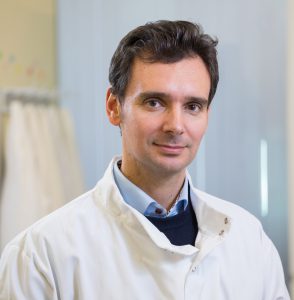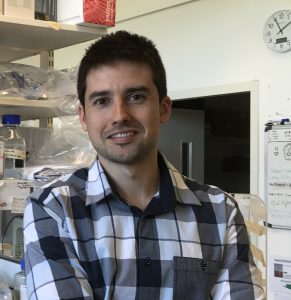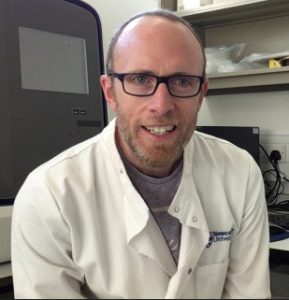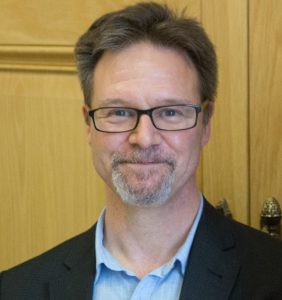Following our Grant Call, we're investing £2 million into new research projects. We'd like to introduce you to the people these awards went to, and what they hope to achieve for men and families affected by prostate cancer.
- Posted: 18 September 2019
- Tagged: Research Updates
Introducing our new projects!
We're spending another £2m on prostate cancer research.
Professor Gerhardt Attard, UCL

Professor Gerhard Attard received a PCR Project Award.
STAMPEDE: which drug will work best for me?
STAMPEDE is one of the largest ongoing clinical trials on advanced prostate cancer in the world, and has already led to changes in the way prostate cancer is treated. This latest research will look at DNA in tumours from men, who took part in STAMPEDE, and whose prostate cancer spread.
The team will see whether differences in DNA can be used to divide the men into groups which are more or less likely to respond to different treatments. By combining the results from this project with other research projects from STAMPEDE, they have a unique opportunity to develop an affordable test which could soon be used in the clinic to help doctors choose the right treatment for patients based on the specific profile of their individual cancer.
The Scientist Said...
“We have some very promising results on copy number profiling of a pilot set of 50 STAMPEDE tumours. PCR funding will enable us to expand our analyses to tumours from 675 men who received hormone therapy alone or with Abiraterone or Docetaxel and test the hypothesis that based on a cancer’s copy number profile, a decision on whether to use Abiraterone or docetaxel or no additional treatment can be made. This will be invaluable information for physicians and patients and allow us to implement precision medicine for these important treatments.” – Gerhardt Attard
Dr Daniel Brewer, University of East Anglia

Dr Daniel Brewer received a PCR Project Award.
AI: Computing Solutions for Prostate Cancer
Prostate cancer is the name used for all cancers that start in the prostate, but prostate cancer tumours can be very different from each other. Some cancers grow very slowly and remaining confined to the prostate for decades (pussycats) while others rapidly grow, are aggressive, and lead to advanced disease and death (tigers).
Dr Daniel Brewer, along with his co-investigators, David Wedge and Dan Woodcock, hopes to use AI to separate the pussycats from the tigers. Between them, the three scientists will use complicated mathematical and artificial intelligence tools to analyse a huge amount of data which is already out there. They hope to discover disease subtypes that may behave differently. Some cancers might have unique features which make them particularly suitable for a certain type of treatment, and identifying cancers that grow quickly or are unlikely to grow at all can help to decide if treatment is needed in the first place.
The Scientist Said...
“One of the big problems in prostate cancer is that despite being highly variable there are no well-defined disease subtypes that are used in clinical practice. In breast cancer, the discovery of subgroups has underpinned better treatment strategies and patient outcomes, and we want to do the same in prostate cancer. We are really excited to be given the opportunity by PCR to perform this amazing research and hope that a result there will be a radical improvement in the way prostate cancer patients are treated.” – Daniel Brewer
“It is fascinating to be part of the process of selecting projects for funding but it is a hard job to draw distinctions between proposals that are all very worthy in their own ways.
Dr David Matheson
PCR Patient Panel Member
Professor Bart Cornelissen, University of Oxford

Professor Bart Cornelissen received a PCR Pilot Award.
Improving Radiotherapy
PSMA is a protein which exists on the surface of most prostate cancer cells, but is not on normal cells. PSMA can be used to tell cancer and normal cells apart, and even to guide radiotherapy directly to the cancer cells. While this new treatment is becoming more available in the UK and has potential to help many men, it doesn’t work for all patients right now.
This project aims to make PSMA treatment work better and work in more men by combining it with other drugs. For example, because radiotherapy works by damaging the DNA inside a cancer cell, adding another drug which damages DNA in a different may might make both treatments work even better than either of them used on their own. To start, Professor Cornelissen will combine the radiotherapy treatment 177LU-PSMA with approximately 1,000 drugs.
The Scientist Said...
“Late-stage prostate cancer remains challenging to treat, especially cancer that has spread to other organs, and is resistant to testosterone removal therapy. Using this PCR award, we will investigate novel therapy combinations for prostate cancer, to increase tumour kill, while reducing unwanted side-effects. This award will allow us to perform these studies on an unprecedented scale, an exciting prospect. It increases the likelihood we will find a potent combination of therapies, improving the prospects for long-term cures in this group of cancer patients.” – Bart Cornelissen
Dr Jorge de la Rosa, University of Cambridge

Dr Jorge de la Rosa received a PCR Pilot Award.
PTEN: Finding the off switch
Inside our cells there are “on switches” which tell cells to grow and make more copies of themselves, and “off switches” which stop cells growing and dividing. These switches trigger chain reactions and exist as part of a complicated network, like the wires inside a computer or the switches in a fuse box. When a normal cell turns into a cancer cell, it can be hard to work out which switch has tripped.
PTEN is a ‘tumour suppressor’ or off switch which doesn’t work properly in almost half of advanced prostate cancers. This project aims to understand what other changes happen at the same time that PTEN stops working, and how these changes inside the cell work together to drive the growth and spread of prostate cancer.
The Scientist Said...
“In this research project we will develop new genetic tools that will mimic the development of human prostate cancer. We aim to identify and understand the faulty genes that cause human prostate tumours to spread, and eventually find the “vulnerabilities” of these disseminated cancers. I am very grateful to PCR and I feel very excited about this work, which I hope will bring new prognostic and therapeutic opportunities for people with prostate cancer.” – Jorge de la Rosa
We want to say A MASSIVE THANK YOU to our Racers for Science, our marathon runners, mountain climbers, generous givers, and all of our #TeamPCR superstars who’ve made all this possible.
Dr Harveer Dev, University of Cambridge

Dr Harveer Dev received a PCR Pilot Award.
ProCASP: could damaging DNA cure my cancer?
DNA writes the code which makes our cells. Unfortunately, DNA is also fundamental to cancer. DNA damaging agents (DDA) can be used to treat prostate cancer. They can damage genes leading to the death of cancer cells, but at the minute, doctors can’t predict which cancers will be killed by DDAs and which won’t before they start treating a patient.
This project will create an exciting new tool called ProCASP. ProCASP will be used to change DNA in prostate cancer cells taken from patients. Then, the researchers can see which genetic changes help DDAs kill cancer, and which changes stop DDAs from working. This research will help us find patterns in DNA that can be used to identify patients who will benefit from DDA treatment.
The Scientist Said...
“We are tremendously excited to work with the PCR to deliver ProCASP; the Prostate cancer CRISPR-Cas9 dynamic Screening Platform. We will be establishing this first-in-kind system in order to explore how patient-derived cancers respond to existing and emerging therapies. This will allow us to identify individual patients who may benefit from specific early interventions. Our project represents an important step towards delivering personalised care and improving outcomes for patients with lethal disease.” – Harveer Dev
Dr Luke Gaughan, Northern Institute for Cancer Research at Newcastle University

Dr Luke Gaughan received a PCR Project Award.
Hormone Therapy: Stopping resistance in its tracks
Hormone therapy works by stopping a protein called the androgen receptor (AR) from telling cancer cells to grow. Normally the AR exists in two parts, with the outside part like a switch that needs to be turned on by male hormones, so that the inside part can help the cancer to grow and spread. On normal AR, drugs can turn that switch off. But sometimes different versions of the AR, called AR variants, or ARVs, are made. ARVs are cut-off versions of the AR which don’t have a switch to turn on or off, but are always on. They exist in about 95% of prostate cancers which have spread, and hormone therapy doesn’t work on them.
This team have developed cutting-edge technology to give powerful insights into how ARVs are made in advanced prostate cancer cells. They will find out how ARVs are made, and how this process could be stopped.
The Scientist Said...
“Together with my co-leads on the PCR-funded project Mr Rakesh Heer, Consultant Urological Surgeon, and Prof Craig Robson, we will be undertaking a super novel approach to study how we can prevent advanced prostate cancer-associated forms of the androgen receptor being generated. By blocking this process we will be able to prevent disease progression. We are thrilled to be part of the national PCR research team and are very much looking forward to helping deliver new targets for future treatments to help men with prostate cancer.” – Luke Gaughan
Professor Iain J McEwan, University of Aberdeen

Professor Iain J McEwan received a PCR Project Award.
Hormone Therapy: Old Dog, New Tricks
Male hormones help prostate cancer to grow and spread by attaching to proteins called androgen receptors (AR). Many men are treated for prostate cancer with hormone therapy, ADT, which blocks the action of male hormones (androgens). The problem is that in some men, after some time, cancer will learn to grow and spread despite ADT.
This drug discovery project aims to stop androgens from fuelling cancer even after resistance to existing drugs develops. Iain’s research team are working on attaching exciting new drug combinations to a different, but equally important part of the AR than the part ADT usually works on. Hopefully, this could keep hormone therapy working for men with prostate cancer.
The Scientist Said...
“We aim to develop novel ways of switching off the activity of a protein called the androgen receptor, which is key to prostate cancer cell survival. Our highly innovative, and collaborative, approach marries medicinal chemistry (Dr Craig Jamison, University of Strathclyde) with biologics (protein-based drugs), developed in partnership with Elasmogen Ltd, a biopharmaceutical company. If successful this has the potential to significantly improve the outcome for men with advanced disease.” – Iain J McEwan
“We are delighted to be scaling up the number of researchers we are supporting by 175%. Only by finding and funding exceptional scientists with novel ideas can we expect to make real differences to the lives of patients. Our single long term aim is for all people with Prostate Cancer to receive personalised effective care that enables them to live full and healthy lives.
Oliver Kemp
CEO, PCR
We’ll soon be working with our new scientists to create project pages, such as we have for our current PCR projects, to really bring these exciting new projects to life. In the meantime, if you want to know more, contact us at [email protected].
A panel of prostate cancer patients and their family members helped us to select these projects. If you have been affected by prostate cancer and would like to use your experiences to help other patients, email [email protected] for more information.
If you are a researcher and would like to be kept informed of future grant calls, please email [email protected] with ‘Grant Call Opt-in’ in the subject line.